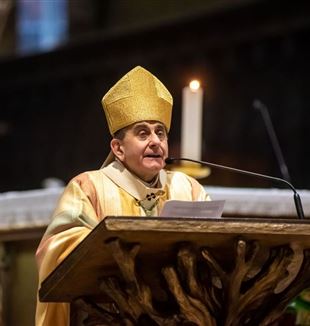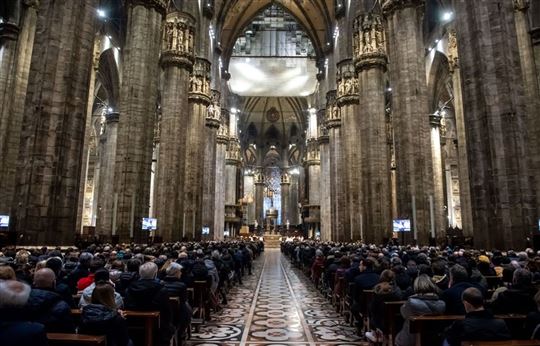
The people of peace perform works of peace
Archbishop of Milan Monsignor Mario Delpini's homily and Davide Prosperi's greeting at the Mass in Milan’s Cathedral for the 18th anniversary of Fr. Giussani's death.1. In the beginning is the gift
In the beginning is the gift, in the beginning is the manifestation of God's glory that fills life, the earth, and rejoices God himself, "And he saw that it was good, very good." And the time comes when the beloved children, filled with every good, endowed with every beauty, and rich in every gift come, come to be aware of it. What form will the awareness of the innumerable goods that the beloved children have received as gifts take? What words will they say? What story will they want to write in the presence of the good Father, the Most High God?
2. Instead of gratitude...
When consciousness matures into awareness it may be that the first word is the word of self-congratulation: how beautiful I am! How clever I am! How many things I am capable of doing, of doing well! Self-congratulation may be the creeping in of a temptation, it may lead one to withdraw into oneself, to a kind of childish stillness, like Narcissus' pause at the edge of the fountain.
Becoming aware of the gifts received can also fuel presumption. Presumption is a form of deafness: it ignores the fact that everything is a gift received, forgets from whom the grace of being alive and endowed with grace comes, takes possession of one's condition and considers it a right. Thus presumption counsels daring undertakings, fuels reckless enthusiasm, provokes contemptuous thoughts towards others who are also brothers loved by the one Father. From contempt and conceit come projects of domination, and this is also why wars and quarrels arise, as James interprets: What causes fights and quarrels among you? Don’t they come from your desires that battle within you? You desire but do not have, so you kill. You covet but you cannot get what you want, so you quarrel and fight (James 4:1-2).
Even resentment and envy can come from the consideration of the gifts received, considering the gifts of the other brothers. Thus originates Cain's grievance that eats away at his soul and darkens his mind: why did not the Father give to me what he gave to my brother? Why does the Father prefer my brother to me?
3. Outdo one another in showing honor.
The people of peace reject the temptation of complacency, conceit, envy. Instead, the first word is gratitude: we are gathered here to pronounce the first reasonable, good, virtuous word: "Thank you, Father, for all the gifts that enrich our lives! Thank you, today, in particular, for the gift of the encounter, the charism, the witness of Fr. Giussani!"
And the glad and grateful soul practises the virtuous attitudes recommended by Paul.
Outdoing one another in honoring each other is the most promising path to knowledge. Esteem is not only admiration for what others are and have, but it is the disposition of one who expects something, who accepts the words and deeds of others as an illuminating revelation and a desired gift. Those who feel esteemed are encouraged to recognize their qualities and put them to good use, to give the best of themselves. Those who esteem the people they meet, with whom they share life, in the family, at work, in social life, in politics, listen willingly, and are also enriched by the gifts of others and become better precisely because of the encounter, the opportunity to work together, to build together. Esteem is the accompaniment that makes it possible for parents and educators in general to encourage younger people to live life as a vocation, to put the gifts they have received to good use, even those that perhaps they have not yet even recognized. Esteem among adults, among groups, associations, movements is the condition for the community to grow as a common house rich in many gifts, inhabited by joy, living up to the mission. Esteem among peoples predisposes the path of peace, to covenant, to the exchange of gifts. Will the people of peace be able to introduce into relations among peoples this competition for honoring one another?
4. Associate with the lowly.
While conceit predisposes to rivalry, to contempt for others and thus to quarrels and wars, the attitude of gratitude predisposes us to humility, to that being of service to one another which sustains the path of those who are called to be glad in hope, strong in tribulation, persevering in prayer.
The people of peace accept Paul's invitation: do not aspire to things that are too high; instead, associate with the lowly.
5. Mary Queen of Peace; the Communion and Liberation Movement, people of peace.
The grateful belonging to the movement of CL has gathered here, and in every part of the world, a numerous people: summoned by gratitude, called to accept Paul's invitation to compete in honoring one another and associate with the lowly, we invoke Mary, Queen of Peace, for too many absurd and apparently insoluble wars afflict the earth. Let us weep with those who are in mourning.
May Mary's intercession, the charism of Fr. Giussani, encourage all to be the people of peace, for fraternal harmony among all the components of CL, for the gift of the international spread of the movement that encourages honor among peoples and the assumption of responsibility to be peacemakers.